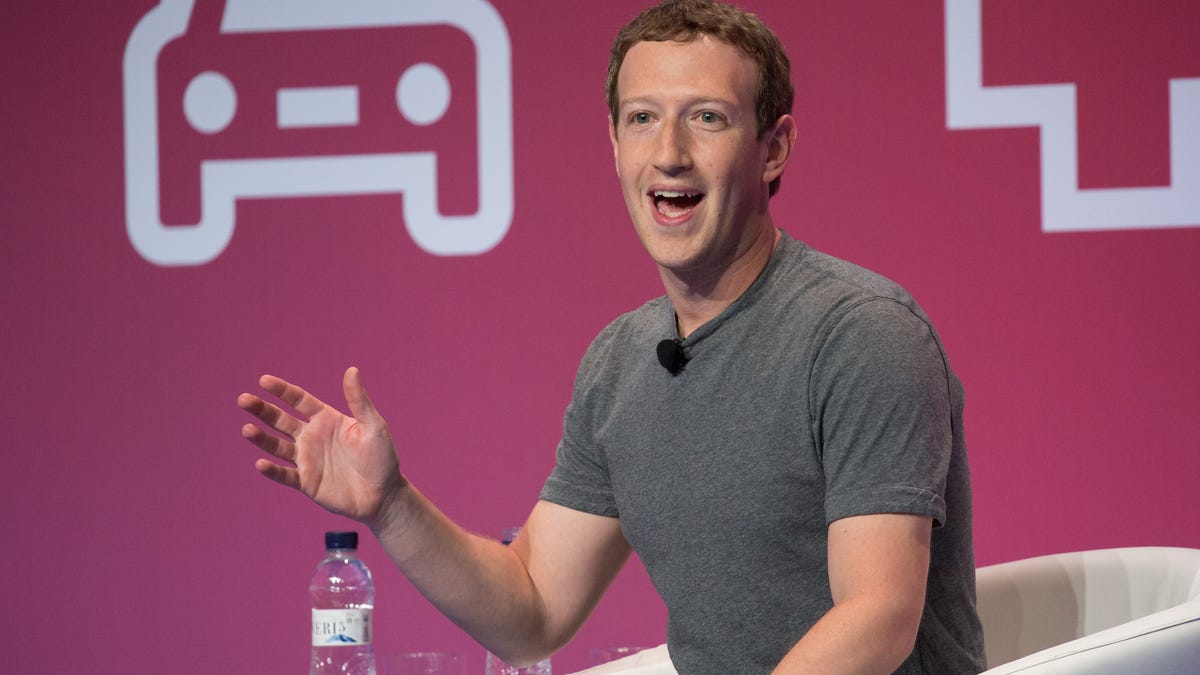Facebook aims to quell controversy with connectivity vision at MWC 2019
The social network has a long history of making announcements about initiatives to grow internet connectivity at the Barcelona tech show.

Facebook CEO Mark Zuckerberg speaks at Mobile World Congress 2016 in Barcelona, Spain.
At the biggest mobile show in the world, it's easy to be blinded by the vast array of shiny new phones . They have a tendency to hog the spotlight.
But look a little closer and you'll see Facebook at MWC 2019. No, it's not launching a phone -- HTC tried that with the Facebook button-rocking ChaCha back at MWC 2011 with little success. Instead, it will likely continue to press an issue that's long been a priority for the company: improving internet access and getting more people on its social network.
Go back a few years, and you'll see when Facebook really made its presence felt at the show. CEO Mark Zuckerberg was spotted in running shoes pounding the streets of Barcelona ahead of his packed keynote, and making a surprise appearance at Samsung's press conference.
But last year was the first time since 2014 that Zuckerberg didn't make hold his Monday night keynote speech at the conference. Instead, he left junior executives to host private meetings tucked away in hidden corners of the convention center. You can expect more of the latter this time around.
Mark Zuckerberg made a surprise cameo at a Samsung launch event in 2016. Those were simpler times.
It's easy to see why Facebook would want to walk on eggshells. Just weeks after last year's MWC, the social network found itself caught up in the worst scandal in its 10-year history after the revelation that Cambridge Analytica had exploited the data of 87 million users. The company's presence at the European show comes as it faces a new antitrust battle in Germany, along with continued concerns about privacy and company culture.
Facebook faces the challenge of trying to get its message of connectivity heard above the noise of the troubles that continue to dog the company.
Facebook's connectivity push
In August, Facebook collected its various initiatives to bring more people online under a new banner, Facebook Connectivity, and hired Dan Rabinovitsj as vice president to lead this part of the company. In accordance with the trend that's established over past MWC shows, we're expecting to hear more about this mission.
But even Facebook's attempts to improve internet connectivity around the world have come under fire, seen as dressing up self interest as philanthropy. Helping more people get online is in the company's interests, as it expands the number of people who can potentially use its services.
Programs such as its Free Basics initiative, which brought people with basic phones a cheaper, pared-down version of the internet, raised net neutrality concerns.
At MWC 2016, Zuckerberg attempted to move the company past the Free Basics controversy and announced an initiative to enhance the web's underlying infrastructure -- the Telecom Infra Project (TIP). This is effectively an engineering project that involves network companies such as Nokia and Ericsson , as well global telecoms providers including Orange and Telefonica collaborating on solutions for major connectivity challenges.
In the past its announcements at the show "have generally focused on its efforts to grow its audience in less mature mobile first markets," said IHS Markets analyst Jack Kent over email. "These type of deals involved partnerships with network operators, but also required Facebook to attempt a fine balance between promoting its own services and broader internet access."
Getting into 5G
The past two MWCs have given us updates on this project, and we can expect more of the same year, even if Facebook takes more of a backseat than in the past.
"As more partners have become involved in TIP, Facebook has somewhat scaled back its presence but it is still a key player here," said Kent. "In terms of what to expect for MWC, 5G -- as with everything else -- will likely be a focus for TIP and expect to see work on the more advanced mmWave technologies."
Facebook did not respond to request for comment about its MWC activities, but an events page on the TIP website gives us some clues. Most TIP panels and demos are scheduled to take place in Facebook's own private event space at the show, with topics including its high-speed millimeter wave project and "developing the Wi-Fi ecosystem," as well as a new, unnamed project that will be announced at the show, "which will focus on an exciting aspect of future 5G networks."
Beyond connectivity, a number of other notable Facebook employees will also be repping the company at MWC. They include Nicola Mendelsohn, vice president of the European business, who is due to address startups at the 4YFN side conference on Tuesday, and Yann LeCun, Facebook's chief AI scientist, who will speak on a panel on Monday.
It's easy to get lost in the scrum when there are so many top tech companies competing to be heard at MWC, but it pays to look closely at those who are trying to build and underpin the backbone of the entire internet. Facebook is one of those companies, so keep your eyes peeled this week, as we'll be bringing you all the latest news about its announcements straight from the show floor.

